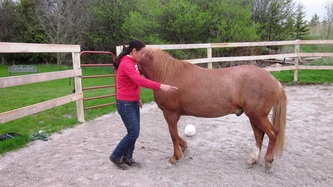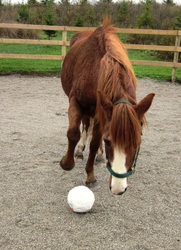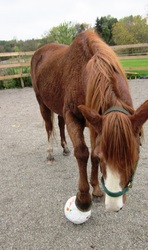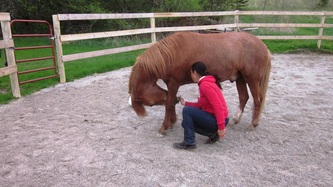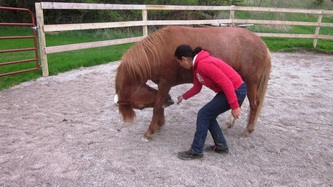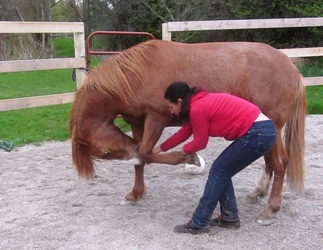Equine Learning
Domestic horses are very co-operative with humans and learn tasks very quickly if their past experiences are appropriate and the task is broken down in parts that the horse is able to understand. As horses often learn a task in very few tries, they may also learn to do the ‘wrong thing’ easily if the cues are not clearly understood or the ‘wrong behaviour’ is accidentally reinforced by a trainer/owner that does not understand the importance of correct timing. Underestimating or overestimating a horses’ ability to learn a (complex) tasks could result in a vicious circle of stress for both horse and human, which creates an unproductive learning environment. The more you teach a horse according to the way it learns, the easier the horse will learn and understand in the future. It is like an exercise for its brain.
Breed differences mainly influence reactivity when it comes to horse behaviour. The hot blooded breeds like Arabians and Thoroughbreds are more reactive and respond stronger to stimuli than cold blooded breeds like draughts and many pony breeds. Studies have shown that the hot blooded breeds are more sociable as well, thus keeping these breeds in single housing or removing them from paddock or herd mates might have a compound effect on their behaviour.
Tests have revealed that horses are capable of discriminating between complex two-dimensional shapes, procedure learning and concept formation; in layman terms: ‘putting two and two together’. However, like in humans, the horses’ brain has to be exercised in order to ‘learn how to learn’ and it has to be motivated in order to do so. The ability of concept formation allows the horse to transfer what it has learned to similar situations in the future. It is as of yet impossible to measure the intelligence of a horse, but we may assume that there are differences in intelligence between horses, just like with humans. How horses apply that intelligence will depend on their experiences and prior training.
Breed differences mainly influence reactivity when it comes to horse behaviour. The hot blooded breeds like Arabians and Thoroughbreds are more reactive and respond stronger to stimuli than cold blooded breeds like draughts and many pony breeds. Studies have shown that the hot blooded breeds are more sociable as well, thus keeping these breeds in single housing or removing them from paddock or herd mates might have a compound effect on their behaviour.
Tests have revealed that horses are capable of discriminating between complex two-dimensional shapes, procedure learning and concept formation; in layman terms: ‘putting two and two together’. However, like in humans, the horses’ brain has to be exercised in order to ‘learn how to learn’ and it has to be motivated in order to do so. The ability of concept formation allows the horse to transfer what it has learned to similar situations in the future. It is as of yet impossible to measure the intelligence of a horse, but we may assume that there are differences in intelligence between horses, just like with humans. How horses apply that intelligence will depend on their experiences and prior training.
Motivation: What's in it for the Horse?
A horse, like humans, needs to be motivated to learn. Whatever we want our horse to do, there needs to be something in it for the horse, otherwise, why would it go through all this trouble? Does the horse care how many ribbons it wins? No, that's the human's motivation. Does the horse care that it's worth more money when it's trained? Nope! Does the horse care if it will be fed that day if it doesn't oblige? Again, No, most horses are on a tight feeding schedule (also something humans like to do). So what is it then? For humans it could be: happy teacher, pretty stickers, happy parents, self-fulfillment and eventually better chances on the job market (sense of financial security). A horse lives more in the present, so for a horse motivation could be: the removal of something unpleasant (pressure), avoiding of something unpleasant to happen (scary whip, angry trainer, forceful handling, hitting an obstacle etc.), spending time with human, obtaining a treat, wither scratch or other positive attention, happy trainer, reducing boredom, enrichment, getting out of his stall etc.
It pays off to find out what motivates a horse other than cracking a whip behind it, as that often initiates a fear response, followed by a flight response and in some horses it provokes aggression. A frightened, stressed or aggressive animal is not open to new learning. When you chase a frightened horse with the whip long enough, it doesn't learn anything valuable, it learns to give up, you won! That is, if you like your horse to become more like a robot and that would be a shame, because a horse is capable of so much more than that!
It pays off to find out what motivates a horse other than cracking a whip behind it, as that often initiates a fear response, followed by a flight response and in some horses it provokes aggression. A frightened, stressed or aggressive animal is not open to new learning. When you chase a frightened horse with the whip long enough, it doesn't learn anything valuable, it learns to give up, you won! That is, if you like your horse to become more like a robot and that would be a shame, because a horse is capable of so much more than that!
